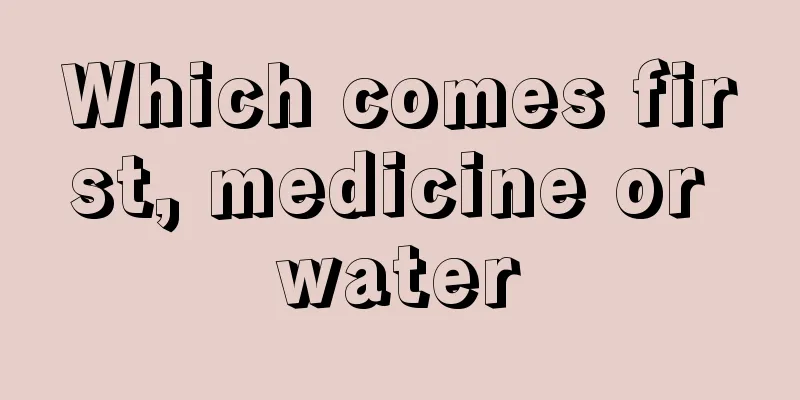Which comes first, medicine or water

|
Most people know that they need to take pills, capsules, etc. with water. But if you don't grasp the timing of this small action, you may feel uncomfortable or even affect the efficacy of the medicine. The best drink to take medicine with is plain water. Water can lubricate the esophagus and accelerate the dissolution of drugs in the stomach, promoting absorption. In addition, water can reduce the damage of food and stomach acid to drugs and relieve the irritation of drugs to the gastrointestinal tract. When taking different dosage forms of drugs orally, the requirements for drinking water are slightly different:
Capsules: Drink some water first to prevent them from sticking to your mouth. If you pour the capsules onto your palm, it will easily feel sticky, as if it is stuck to your hand. Taking medicine is similar. If your mouth is very dry, taking the capsules directly will easily stick to your mouth and be difficult to swallow. If it attaches to the esophageal wall, it may cause damage and, in severe cases, ulcers may occur. Drinking about 50 to 100 ml of water before taking the capsule to ensure that your mouth is moist can prevent this from happening. After putting the capsule in your mouth, drink about 200 ml of water to help swallow it. Orally disintegrating tablets Don't drink water until it is completely decomposed. Orally disintegrating tablets can disintegrate quickly in the mouth and take effect quickly, making them suitable for children and the elderly. It is not advisable to drink water when taking this type of medicine, otherwise it will affect the effectiveness of the medicine. Wait until the orodisintegrating tablet is completely dissolved before drinking water. syrup It is best to drink water half an hour after taking the medicine. Cough syrup can form a protective film on the surface of the pharyngeal mucosa, reduce local irritation caused by inflammation, and relieve cough symptoms. It is recommended to drink water half an hour after taking it to avoid affecting the effect. In addition, after entering the gastrointestinal tract, drugs such as magnesium aluminum carbonate and montmorillonite powder will turn into tiny particles, covering the gastrointestinal mucosa to form a protective film. If you drink a lot of water immediately after taking this type of medicine, it will "dilute" this protective film and affect the efficacy of the medicine. It should be noted that some special medicines require more water intake. For example, sulfonamides and quinolone antibiotics are prone to precipitate crystals in the urine during metabolism and damage the urinary system. Therefore, you must drink plenty of water while taking them to reduce these side effects. When taking anti-gout drugs, you also need to drink more water to promote the excretion of uric acid. |
<<: What facial cleanser is good for acne
>>: Eating spicy food can relieve stress at work
Recommend
MRI Screening for Prostate Cancer
Prostate cancer is one of the most common maligna...
Will straightened hair become curly after cutting
The straightened hair will become curly after bei...
What stage does a 2 cm lung cancer belong to
It is impossible to determine exactly what stage ...
What is the charge for tongue cancer
Nowadays, the biggest concern when going to the h...
Can pearl powder be used to brush teeth?
Pearl powder is a product that can whiten the ski...
How to deal with accidentally eating SpongeBob SquarePants
In our daily life, many chemicals are actually no...
Precautions for clinical nursing of teratoma
Teratoma is generally treated with surgery, and r...
Why is pancreatic cancer the king of all cancers
Pancreatic cancer is known as the "king of a...
The dangers of canned intestines
In today's daily life, there are a lot of del...
What are the early symptoms and signs of uterine cancer?
Early symptoms and precursors of uterine cancer m...
Medicine for treating plantar warts
Plantar warts are a type of wart that grows on th...
What are the symptoms of goiter
Goiter is not uncommon, and the occurrence of the...
The difference between hairy crabs and hairy crabs
In our daily life, we find that there are many ty...
What are the symptoms of ovarian cancer that are easy to ignore? Be alert if you see these 5 major signals
We have to be on guard against cancer. In additio...
Drinking more water can keep you away from bladder cancer? How to take care of yourself after bladder cancer surgery
Bladder cancer is very harmful to the body, so on...









